|
|
|
Sort Order |
|
|
|
Items / Page
|
|
|
|
|
|
|
| Srl | Item |
| 1 |
ID:
153601
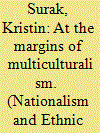

|
|
|
|
|
| Summary/Abstract |
Will Kymlicka's theories of multiculturalism have gained wide interest in the West but only recently have been applied beyond it. This research note assesses whether a Kymlickian approach provides traction for grasping the configuration of nondominant ethnic groupings in Japan and how they have achieved a degree of multicultural recognition. It first identifies equivalents and exceptions within the Japanese case to Kymlicka's key groupings: national minorities, indigenous peoples, immigrants, and metics. It then shows that of these, the last two drove the expansion of multicultural rights. Finally, it examines why they launched claims within a multicultural framework and assess the limits of the multicultural claims for bolstering the rights of subordinate groups.
|
|
|
|
|
|
|
|
|
|
|
|
|
|
|
|
| 2 |
ID:
052552
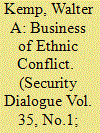

|
|
|
| 3 |
ID:
165967


|
|
|
|
|
| Summary/Abstract |
Research into post-independence identity shifts among Kazakhstan’s Russian-speaking minorities has outlined a number of possible pathways, such as diasporization, integrated national minority status and ethnic separatism. Drawing on semi-structured interviews with young people in Almaty and Karaganda, I examine how Russian-speaking minorities identify with the state and imagine their place in a ‘soft’ or ‘hybrid’ post-Soviet authoritarian system. What is found is that Russian-speaking minorities largely accept their status beneath the Kazakh ‘elder brother’ and do not wish to identify as a ‘national minority’. Furthermore, they affirm passive loyalty to the political status quo while remaining disinterested in political representation. Russian-speaking minorities are also ambivalent towards Kazakh language promotion and anxious about the increasing presence of Kazakh-speakers in urban spaces. This article argues that two factors are central to these stances among Kazakhstan’s Russian-speaking minorities: the persistence of Soviet legacies and the effects of state discourse and policy since 1991.
|
|
|
|
|
|
|
|
|
|
|
|
|
|
|
|
| 4 |
ID:
118742
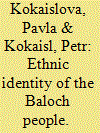

|
|
|
|
|
| Publication |
2012.
|
| Summary/Abstract |
The national self-awareness of the Balochis, who live in several countries and have no statehood, is very specific in many ways. The problem of their identity can be better understood in the context of certain parallels between them and European peoples (ethnic groups), since their ethnogenesis displays certain common features. We should bear in mind, however, that the formation and development of the Balochis differed in many respects from those of the European peoples.
The Balochis of Iran, Afghanistan, Pakistan, and Turkmenistan are not absolutely identical, in this respect they differ greatly from the Europeans.
|
|
|
|
|
|
|
|
|
|
|
|
|
|
|
|
| 5 |
ID:
095098


|
|
|
| 6 |
ID:
127651


|
|
|
|
|
| Publication |
2014.
|
| Summary/Abstract |
Spontaneous and organized population movements have long been used as a means of promoting a country's goals of development and national integration. At the local level, on the other hand, these movements have frequently done the opposite, fueling local grievances, sharpening group distinctions, and at times creating 'sons-of-the-soil' conflicts. In this paper, I explore this apparent tension between the national political rationale for internal migration and the political impact such migration has had locally, in four minority regions of China and Indonesia. I argue that the specific manner in which migration affects local politics is influenced by a country's political regime. In Indonesia, the impact of migration is observed in electoral politics, where 'politics of place' have been allowed to emerge. In China, it is perceived in the curbing of national minorities' territorial autonomy. The role played by local elites and group competition between indigenous people and migrants are also reviewed.
|
|
|
|
|
|
|
|
|
|
|
|
|
|
|
|
| 7 |
ID:
095089
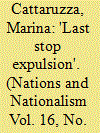

|
|
|
|
|
| Publication |
2010.
|
| Summary/Abstract |
This article deals with the European minorities in the period between the two world wars and with their final expulsion from nation-states at the end of World War II. First, the tensions which arose between the organised minorities and the successor states of the Habsburg Monarchy are accounted for primarily by the argument that the various minorities located within the successor states had already undergone a comprehensive processes of nationalisation within the Habsburg Empire. Therefore they were able to resist assimilation by the political elites of the new titular nations (Czechs, Poles, Rumanians, Serbs). A second topic is that of the use made of the minorities issue by Adolf Hitler to help achieve his expansionist aims. The minorities issue was central to the international destabilisation of interwar Europe. Finally, the mass expulsion of minorities (above all, Germans) after the end of the war is explained by strategic considerations on the part of the Allied powers as well as involving the nation-state regimes. It is argued, against a commonly held view, that German atrocities during the period of occupation had little to do with the decision to expel most ethnic Germans from their territories of settlement in Poland, Czechoslovakia and Yugoslavia. The article shows that it is necessary to treat national minorities in the first half of the twentieth century as a single phenomenon which shares similar features across the various nation-states of East-Central Europe.
|
|
|
|
|
|
|
|
|
|
|
|
|
|
|
|
| 8 |
ID:
078821


|
|
|
|
|
| Publication |
2007.
|
| Summary/Abstract |
This article addresses the question of how multiethnic states can manage the relationship between the ethnic majority and the minority. It identifies a series of alternative strategies and methods and applies this classification to two states, Israel and Turkey. The article compares the approaches the two states have taken in dealing with their largest national minorities, and explains how and why these approaches have differed. The article demonstrates how Israel and Turkey adopted two fundamentally different regimes - a civic regime in the case of Turkey and an ethnic regime in the case of Israel - and two different policies towards the largest minority in their midst, assimilation in the case of the former and marginalization in the case of the latter. In both cases, however, the outcome of these policies has been confrontation between the national minority and the state and its ethnic majority. The article concludes by arguing that this similar outcome is due to both states' failure to adopt a genuinely accommodationist approach toward their national minorities
|
|
|
|
|
|
|
|
|
|
|
|
|
|
|
|
| 9 |
ID:
087816
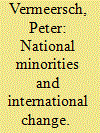

|
|
|
|
|
| Publication |
2009.
|
| Summary/Abstract |
This article explores the question of how the dynamic of interstate relations affects the domestic processes of minority mobilisation. It analyses Ukrainian minority activism in contemporary Poland against the background of the changing relations between Poland and Ukraine. The article argues that the influence of interstate relations on Ukrainian minority activism is more complex than a traditional view of national minority politics would lead us to presume. Starting from this case study, the article argues that there is a need for a contextual and process-oriented understanding of the categories commonly deployed in the study of minority politics in the region.
|
|
|
|
|
|
|
|
|
|
|
|
|
|
|
|
| 10 |
ID:
145303
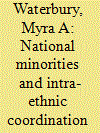

|
|
|
|
|
| Summary/Abstract |
This article investigates the role that intra-ethnic coordination and kin-state alliances play in shaping how parties that represent national minority groups approach their participation in the European Parliament (EP). This is done through an analysis of the political behaviour—electoral strategy, party group choice and modes of interest assertion in the EP—of ethnic minority parties in five Central and East European countries. The article finds that the role of intra-ethnic coordination and kin-state alliances is limited at the level of EP elections, but significant at the level of party group choice and in the visibility of minority issues in the EP.
|
|
|
|
|
|
|
|
|
|
|
|
|
|
|
|
| 11 |
ID:
080804


|
|
|
|
|
| Publication |
2008.
|
| Summary/Abstract |
This paper makes two main arguments. First, federalism in Canada, properly conceived, is a system which evolves as a result of struggles over the norms of mutual recognition between territorially based groups. Second, if federalism is to work as a way of accommodating national minorities, the role of the judiciary in adjudicating this relationship must be taken into account, because it plays an integral role in the continuing contestation of the arrangement.
I begin with the 'problem' of national minorities in the nation-state system and why federalism is espoused as a solution for alleviating tensions, focusing on Canada. I then turn to review the relevant jurisprudence of the Supreme Court of Canada (SCC) in adjudicating the federal arrangement. Finally, considering this jurisprudence, I reflect on why it is important to account for the role of the Court when promoting federalism to accommodate national minorities. I go on to argue that a dialogical approach to federalism, as opposed to a monological one, is best suited to do this.
|
|
|
|
|
|
|
|
|
|
|
|
|
|
|
|
| 12 |
ID:
123212


|
|
|
| 13 |
ID:
133822
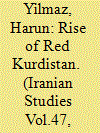

|
|
|
|
|
| Publication |
2014.
|
| Summary/Abstract |
Current literature on twentieth century Kurdish history overwhelmingly covers Kurdish populations and national movements within the borders of Turkey, Iran, Iraq and Syria. This article, hoin Armenia, Georgia, and Azerbaijan,ever, focuses on Soviet Kurdistan and Kurdish policy in Azerbaijan between 1920 and 1937 through the broader question of national minorities within the republic. It is claimed here that the Soviet policy on Azerbaijani Kurds was part of a multilayered issue. First of vnall, the Kurds of Azerbaijan were semi-nomadic mountain dwellers transformed by the modernization policies implemented in Soviet territories. Azerbaijani Kurds were a national identity within the Soviet Union and thus subject to ethnophilic All-Union policies in those years. Finally, Kurds were one of the numerous national minorities in the Soviet Socialist Republic of Azerbaijan who were exposed to the national minority policies executed within the republic by the administration in Baku. The national minority policy in Azerbaijan was often contested and limited by local conditions and obstacles. Therefore, the granting of cultural rights in the 1920s to national minorities, which included the Kurds of Azerbaijan, the promotion of these rights in the 1920s and 1930s, and opposition to these policies can only be examined with regard to these three layers.
|
|
|
|
|
|
|
|
|
|
|
|
|
|
|
|
| 14 |
ID:
121493
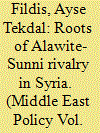

|
|
|
| 15 |
ID:
186032
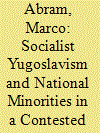

|
|
|
|
|
| Summary/Abstract |
This article analyses the relationship between socialist Yugoslavism and national minorities in a crucial phase of Yugoslavia's post-World War II evolution. It focuses on the contested multicultural Upper Adriatic borderland, specifically on the city of Rijeka–Fiume, the main Italian minority centre in the Federation. Considering both local and broader federal dynamics, as well as Yugoslavia's nascent non-aligned foreign policy, this urban-centred analysis suggests that the insistence on Yugoslavism produced significant contradictions in political relations towards minorities, contributing to the evolution of socialist Yugoslavia's ideological and political system in the early 1960s.
|
|
|
|
|
|
|
|
|
|
|
|
|
|
|
|
| 16 |
ID:
167766
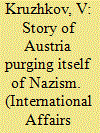

|
|
|
|
|
| Summary/Abstract |
THE WORLD'S main 21st-century objectives include eradication of neo-Nazism and radical nationalism, that harrowing legacy of former turbulent developments.
|
|
|
|
|
|
|
|
|
|
|
|
|
|
|
|
|
|
|
|
|